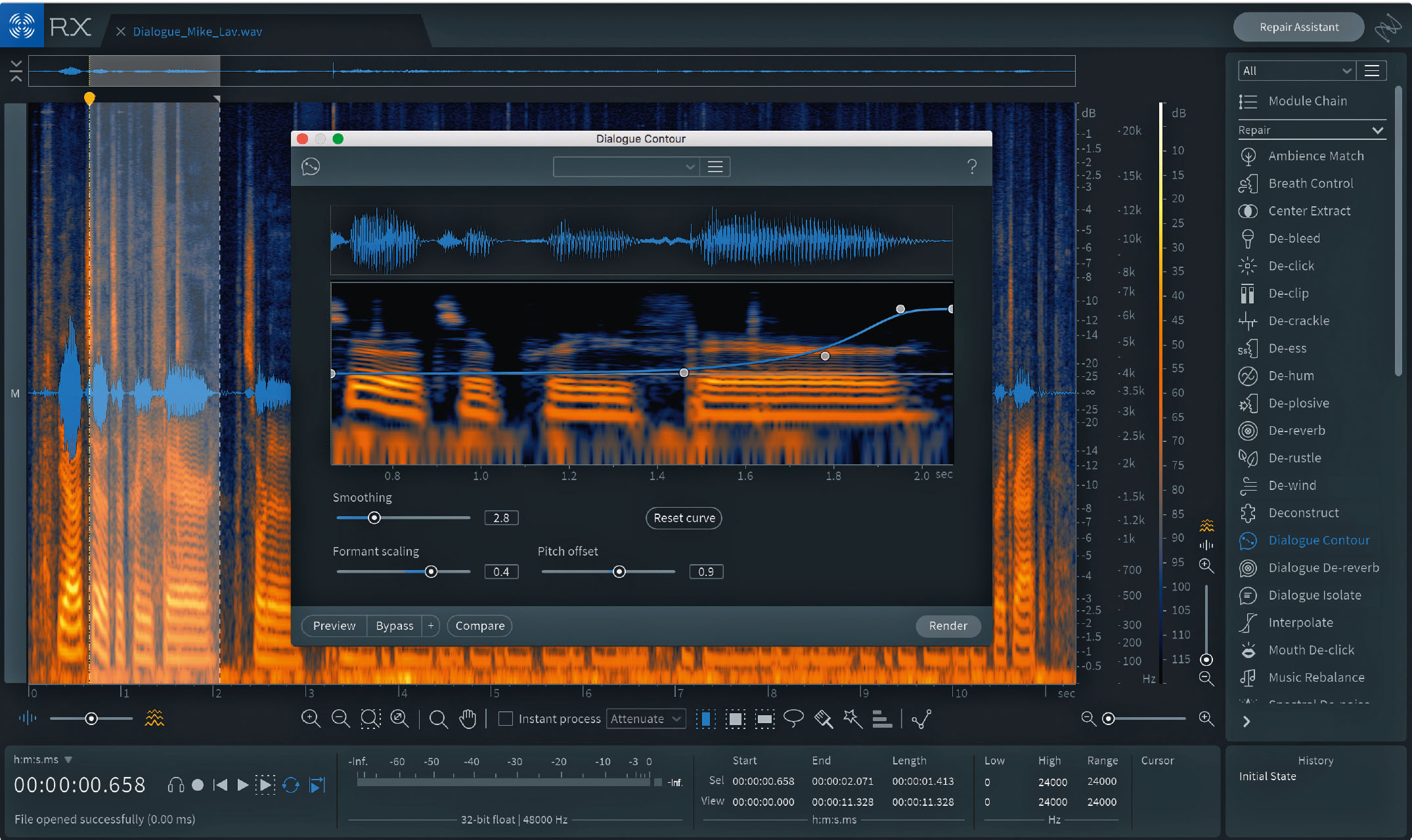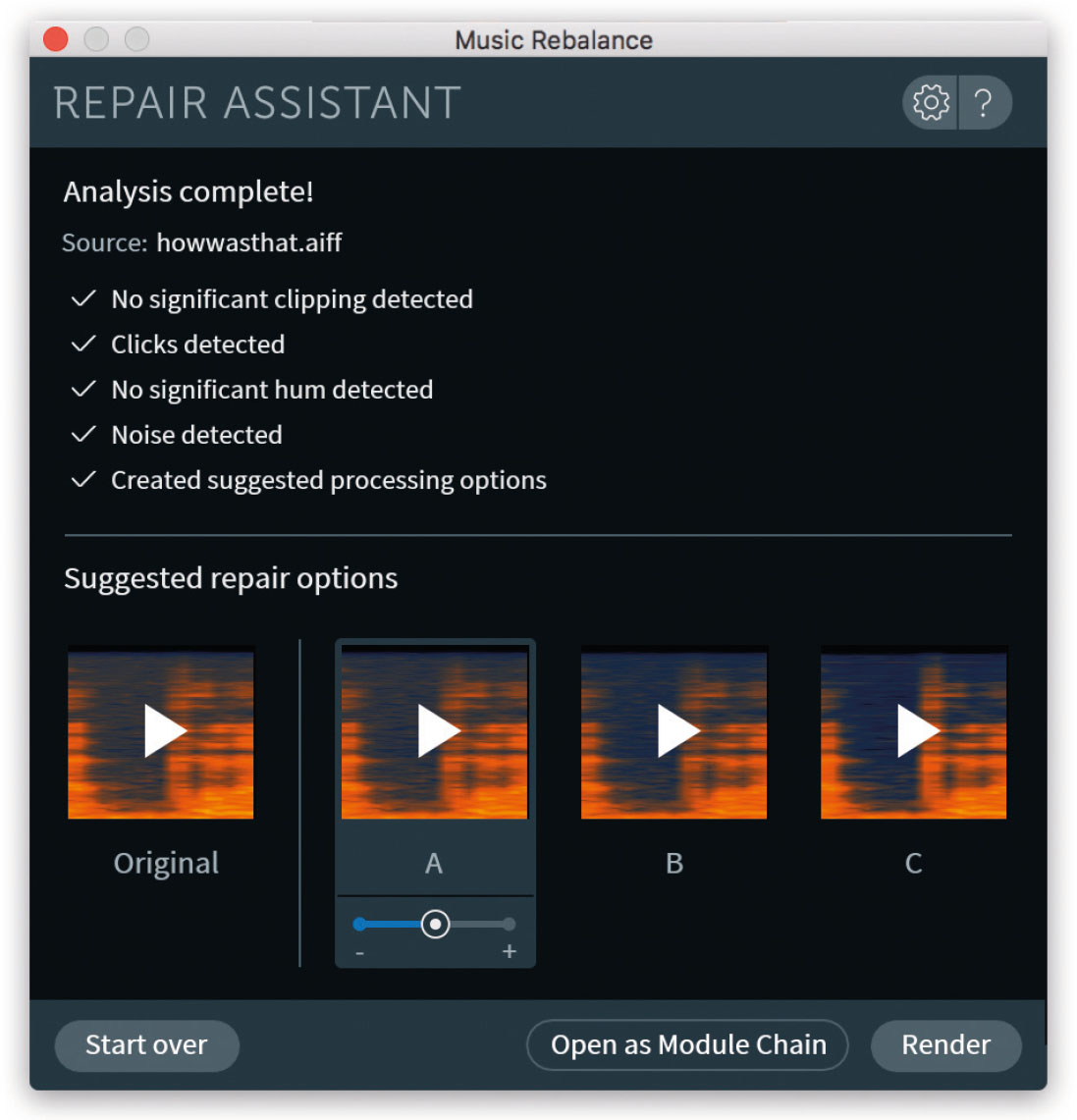
iZotope RX 7
iZotope is an award-winning company developing advanced audio products, many of which have become commonly used in the industry. Well-known products from iZotope include: Ozone 8, its music mastering suite; Nectar 3, for vocal production; and the new RX 7 audio repair suite, which is designed for both music and post-production work. We live in an increasingly aural and visual world where the clarity of audio is expected to accompany compelling visuals in film and video. More and more people are regularly podcasting or making video recordings to post online, and these all require good-quality sound to provide a better experience and accurately convey meaning.
Different editions
iZotope RX 7 comes in three different editions: Elements, Standard and Advanced. The first of these is a useful but somewhat cut-down edition, so I will focus on the Standard and Advanced Editions in this article. The Advanced version has a number of useful modules which are not in other editions including Dialogue De-Reverb, De-Rustle and De-Wind, Dialogue Isolate, and Centre Extract. It also enables many useful modules to be directly available as plugins for your DAW in the usual formats without needing to load up RX 7 itself. However, for access to the complete functionality, your work may need to be carried out in the standalone software.
New RX 7 features

The Dialogue Contour feature of RX 7
The Repair Assistant is an intelligent audio repair tool that does much of the clever stuff for you. After highlighting an area of audio you choose the setting ‘dialogue, ‘music’ or ‘other’ and Repair Assistant analyses the passage and attempts to solve any audio problems. It will offer three different solutions and outline what it has chosen in each solution. You can then sample each and choose which works best. Once selected, you can adjust the degree of change made with each of the solutions, so you have a great deal of control. For the majority of cases Repair Assistant will save an enormous amount of painstaking work.
Another new feature – and possibly the most ground-breaking – is Music Rebalance, which attempts the seemingly impossible task of adjusting the overall music balance by adjusting the percussion, bass or vocals from a stereo wave file. For example, if you have a stereo music track which is fine apart from the drums being too prominent then, with Music Rebalance, you can correct this issue. You can even remove the vocal from the track and create an instrumental version or isolate the vocal part to place this in a different musical context such as remixing projects. I tested out Music Rebalance on several files and overall it works remarkably well. Naturally you may hear occasional unwanted artefacts, especially if you make extreme adjustments, but this module is achieving something quite revolutionary.
Additionally there is Dialogue De-Reverb that can remove annoying background reverb that might make the vocals being sampled less clear. Variable Time enables you to adjust the length of an audio file without affecting its pitch and could be very useful if you have want to synchronise some audio with an existing DAW project – particularly useful for students that want to sample vocals.

Repair Assistant fixes audio issues automatically
More musical modules
The Leveler module is equally relevant to music or dialogue and enables you to balance out the overall level of a vocal track while keeping breaths and sibilance under control. Breath Control is another invaluable module where you can very easily remove or reduce breaths in either sung or spoken audio. You can adjust the sensitivity, since removing all breath will sound artificial, and there is the option to output only the breaths, which could be very useful to detect the sounds you might be removing. This breaths-only output is revealing and ensures you are removing only breath sounds and not some of the singing too! Once again, you can use the ‘compare’ function to choose between several edits and then select the one which achieves your desired outcome.
Other modules helpful within a music context include the De-Click, De-Clipping and De-Crackle, De-Hum and De-Essing for cleaning up audio to be sampled. In addition, the De-Plosive is a very useful way of removing unwanted plosive pops (sounds which can be created when singing or speaking the letters p, b, t and k). With RX 7 running the new Repair Assistant it may be able achieve exactly what you need with little effort.
In conclusion
RX 7 is a very powerful program but also one that is straightforward to navigate. For the majority of musicians, the standard edition of RX 7 may suffice since it includes all the most important features for music needs. However, anyone heavily involved with video editing, film and audio post-production might require the advanced edition. I thoroughly recommend iZotope RX 7 and suggest you check it out.
Information
Pricing (retail)
- RX Elements: $129 [£100]
- RX 7 Standard: $399 [£315]
- RX 7 Advanced: $1199 [£940]
- RX Post Production Suite 3: $1499 [$1180]
A 50% educational discount is available.
You can also download a free 30-day trial through the iZotope's website and all products are sold directly by the company through its online store: izotope.com








